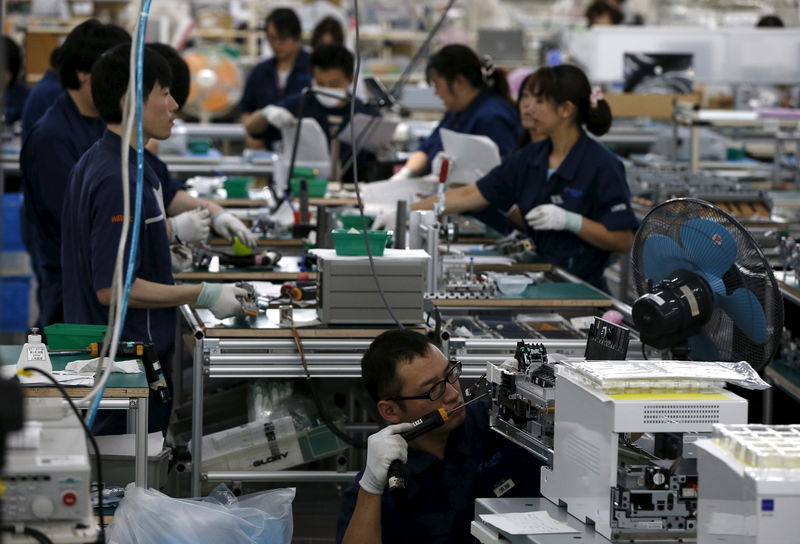By Leika Kihara and Tetsushi Kajimoto
TOKYO (Reuters) - Rising raw material costs and a string of natural disasters that disrupted production sapped business confidence among Japan's big manufacturers in the September quarter, a central bank survey showed on Monday, taking it to the lowest in more than a year.
The survey gave little indication underlying sentiment had been hit by escalating global trade frictions. But the specter of a fully-fledged trade war weighed on companies' business outlook, which could threaten otherwise brisk capital expenditure, a bright spot in the world's third largest economy.
The survey casts doubt on the Bank of Japan's view that a solid economic expansion will help accelerate inflation to its elusive 2 percent target, although there were some signs that companies were gradually passing costs to their customers.
"Sentiment is leveling off due to slowing exports and weakening factory output amid worries of a global trade war," said Takeshi Minami, chief economist at Norinchukin Research Institute.
"Still, the level of sentiment is high. I don't think it will keep deteriorating either, given improving profits and rising prices."
The headline index for big manufacturers' confidence fell to plus 19 in September from plus 21 three months ago, the BOJ's tankan survey showed, deteriorating for three straight quarters and lower than a median market forecast for plus 22.
The index for non-manufacturers fell to plus 22 from plus 24 in the June survey, matching a median market forecast and worsening for the first time in eight quarters.
Both big manufacturers and non-manufacturers expect business conditions to remain unchanged three months ahead, the survey showed.
Investors took the deterioration in the tankan business mood in their stride, pushing Japan's Nikkei share average (N225) to a 27-year high on Monday, as an extended weakening in yen helped improve export earnings prospects for Japanese corporations.
SOLID CAPEX
Despite the somewhat subdued business mood, the latest tankan underscored solid corporate capex plans, driven by demand for refurbishing capacity and boosting investment in robotics and automation to cope with labor shortages in the aging population.
Big companies plan to increase capital expenditure by 13.4 percent in the current fiscal year ending in March 2019, compared with 13.6 percent in the previous tankan survey.
Capital expenditure plans at all firms grew 8.5 percent in this fiscal year, close to the pace seen during Japan's bubble economy era, Minami said.
"There's room for further improvement given that small companies firm up earnings estimates from now on, although that will depend much on how effects of a trade war play out in business sentiment," he said.
In an encouraging sign for Japan's battle with deflation, the survey showed companies became more able to pass on costs, with the index measuring change in output prices at plus 7 for big manufacturers, the highest in a decade.
Underscoring the tightening labor market, the survey's index measuring employment conditions at big firms hit minus 23, meaning the tightest level since 1992.
Japan's economy rebounded in the second quarter from a contraction in January to March thanks to robust business spending.

But a summer of escalating trade frictions and natural disasters that disrupted supply chains cloud the outlook for the export-reliant economy.